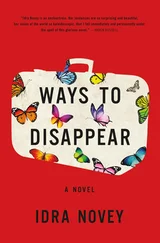We kiss for a long time while his hands find their way under my shirt and mine find their way under his. His fingers stroke my lower back and run along the inside of my waistband; I shiver a little. His lips sink down to my throat, and I want to press him against me while I still feel the hovering touch of his lips and fingers. In the wrinkles that extend from the corners of his eyes I see once more the trees, the forest, his hands and slender fingers. He sees something in my eyes too — what? what? I want to possess it, to know what makes him smile as he slowly undoes the button of my pants and fingers the upper part of my zipper.
“Mia, Mia,” he says.
With my pants off, I sit down on the hood of the lime-colored car parked behind his. I feel the chilled automotive paint and the fallen petals from the cherry tree against the skin of my buttocks.
The streetlamp swings overhead, and its reflection bobs in the paint beneath us — or does it? And all the little yellow-brick houses of the disabled bob around us.
I look up into the light as I draw him in. The trees now a dark jungle, an elephant that stamps and trumpets to drive its enemies off.
Branches before my face. The bellowing grows harsher and quicker and still fiercer and the elephant attacks, it comes blowing toward me, trampling tree trunks and huts, villages, fences, all things in its path as if they were twigs.
And then I hear more stomping: another elephant. It likewise bellows and thunders this way. The sounds of both pounding equally loud in my ears and eyes, through my lips and my fingertips.
For a moment I feel Bernard slide out of me and the sounds vanish, I don’t have time to think.
“No!” I shriek, much too loudly.
He’s already inside again. The elephants stomping toward me again from their respective sides of the forest, the rhythmic booming, the shattered trees, and at last the all-embracing flutter as they crash down over us on the gleaming hood of the handicapped vehicle. Shards of shining ivory and splintered skulls in the moonlight.
Am I absentminded as I stand before my sixth graders the next morning, with a tender crotch and a chin abraded pink by Bernard’s stubble? Decidedly, and in high spirits. I don’t have a clue what my students are asking me.
No one complains; but then again, I’ve been absentminded for months, and at least today my distraction is cheerful.
“Yes, Molly.”
“Why’s negative times negative positive?”
“That’s because … because …”
The beam from the orange streetlamp falls upon us, lighting up the outline of his hair as he leans in over me and I gaze into his features, colossal and blurry, rubbing my face around in his and smearing him over me so he can’t be washed off.
A boy in the back row closes one eye, raises his left arm slowly, and with a quick flip of his right launches a metal lunch box that whizzes a couple of inches past my head, smashing into the wall and tumbling to the floor.
Silence.
I look at him.
“It wasn’t on purpose,” he says hastily, looking confused and a little fearful. “I didn’t know it would go that far.”
The eyes of the class: the girls waiting for him to be chewed out, the boys more inscrutable, as usual.
But I smile at him. “I know why you did it.”
He doesn’t say anything.
“Do you know why you did it?”
“It went too far. I didn’t realize it would fly so far. I’m sorry.”
“Yes. But do you know why you threw it?”
“I just wanted to try—” He stops.
I’d recognized the movement, right down to the closed left eye. “You saw Iron Man on TV two days ago, didn’t you?”
“Yeah.”
It’s copycat behavior, it’s so obviously copycat behavior. That’s the way Robert Downey Jr. throws in the film, and now Mark’s done the same thing without being able to explain why.
Anna raises her hand. “Aren’t you going to scold him?”
“Mark and I will talk after class. Won’t we, Mark?”
“Yeah.”
In some respects I’ve become a poorer teacher since Frederik became ill — not as well prepared, and often distracted during class by thoughts of my miserable home life. Yet in other ways I’ve gotten better.
So much of what kids do and say takes on new meaning when you know a little neurology — for instance, that teenagers’ ability to control their impulses isn’t fully developed yet, which inevitably leads to brief episodes of mild copycat behavior, when they unthinkingly act out something they’ve seen. A watered-down version of the genuinely pathological cases of echolalia and echopraxia.
It also leads to what the textbooks refer to as utilization behavior . If a person with serious damage to the frontal lobes stands in a station waiting for his train, he might find himself entering the first train that stops at the platform, for he has an automated sequence of actions associated with train trips and it’s impossible for his brain to interrupt that sequence. If he sees a bed, he might crawl in under the comforter — even though he knows full well that, at this very moment, he and his wife are shopping in Ikea’s bedroom department.
The frontal lobe deficit isn’t so pronounced in teenagers, but if some cherries are sitting in a bowl they’re not supposed to take from, you risk having them eat the fruit without consciously deciding to do so — even if they’re not hungry. If there’s a ball lying on the lawn, you risk having them kick it, even if it isn’t their ball and some glassware’s standing on a table right behind it. It’s an automated sequence of actions, and once in a while the inhibitory mechanism fails.
Last week I tried to explain this to Helena, but she cut me off. “I actually called to hear about Frederik.”
“Helena, it’s all part of how he’s doing. Don’t tell me that now you’re going to say I talk too much about brain research?”
“Of course not.”
But her voice wasn’t convincing. Helena and my colleagues can’t always follow what I say, and sometimes it’s just easier to talk with Andrea and my other new friends in the support group.
On the phone, Helena and I both hesitated, and then she said, “Tell me about it, I want to hear.”
I tried again. “The kids don’t know themselves why they eat the cherries or kick the ball. When they try to explain, they’re full of rationalizations — exactly like people with frontal lobe injuries who refuse to admit they’re ill. It’s what the doctors call confabulation : when someone with brain damage tries to cover the gaps in their train of thought with fantasies they actually believe.”
Helena no longer sounded impatient on her end. “Okay, I can see how that’s interesting. And I can also see how it’s a big part of what you’ve been experiencing during this shitty year.”
“Good, I’m glad to hear it.”
Helena gave a little snort, which meant she was about to say something she thought was funny. “But Mia, can I tell you something?”
“Yes.”
“If you start using the word confabulation as much as you do perseverate and inhibitory mechanism , I’m going to ask Frederik’s doctor for a lobotomy.”
• • •
The rhythmic booming, the shattered trees, and finally the all-embracing flutter when they collide. During recess, I stop in the middle of the stairs to text Bernard on my way down to the teachers’ lounge.
Last night he again requested that we not see each other anymore, but I didn’t feel devastated. I was in a silly Frederikian mood and giddily promised to stay away from the next support group meeting.
My Frederik mood’s persisted till this morning. What harm could come from a single text?
Читать дальше



![Ally Carter - [Gallagher Girls 01] I'd Tell You I Love You But Then I'd Have to Kill You](/books/262179/ally-carter-gallagher-girls-01-i-d-tell-you-i-lo-thumb.webp)








